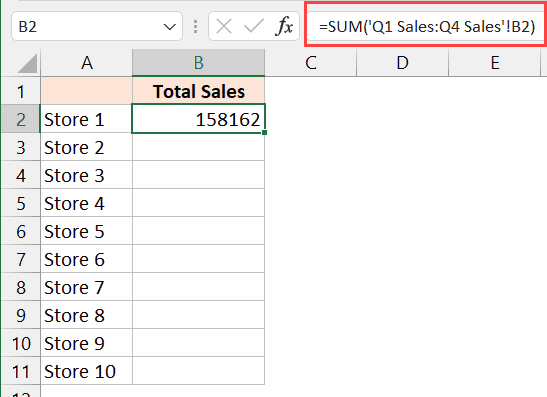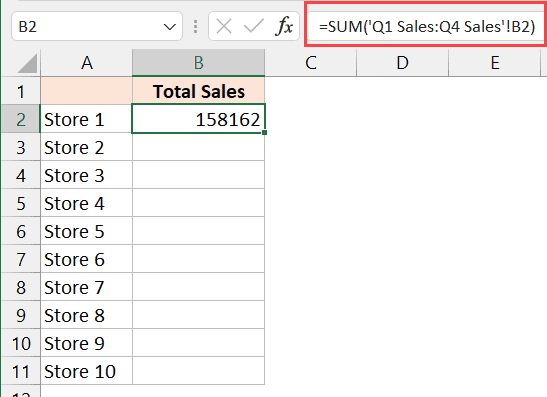5 Easy Tips for Summing Across Excel Sheets

Excel is renowned for its powerful data manipulation features, particularly its ability to perform calculations across multiple sheets. Whether you're consolidating data from various departments, analyzing monthly sales figures, or managing a large project, knowing how to sum across sheets can streamline your workflow significantly. Here are five easy tips to help you master this skill:
1. Use the SUM Function with 3D References

The most straightforward method to sum data across sheets in Excel involves using the SUM function with 3D references. Here’s how:
- Open your Excel workbook with the sheets you want to sum.
- Type =SUM( in the cell where you want the total to appear.
- Instead of selecting a single cell range, select the range across multiple sheets:
- Click the first sheet’s name, then hold Shift and click the last sheet in the sequence you wish to include.
- Select the cell range or column within the first sheet.
- Press Enter. Excel will sum the selected cells across all sheets between the first and last selected sheets.
This technique is especially useful when you have data in the same layout across multiple sheets.
💡 Note: This method assumes that the cell range you select exists in all sheets between the first and last sheets you choose.
2. Consolidate Sheets with Pivot Tables

Pivot Tables are incredibly versatile for consolidating and summarizing data from multiple sheets. Here’s a step-by-step guide:
- Go to Insert > Pivot Table.
- Choose Multiple consolidation ranges and click Next.
- Select the range on the first sheet you want to include and click Add. Repeat for all sheets.
- Finish by choosing where you want your Pivot Table to be placed and click Finish.
- Use the Pivot Table Field List to add fields for summation.
This method allows for dynamic updates and data analysis with more flexibility than a simple sum across sheets.
3. Leverage Named Ranges for Easier Data Management

Using named ranges can simplify your Excel workflows:
- Select the range you want to name in one sheet.
- Go to Formulas > Define Name, enter a name for your range, and confirm.
- Repeat this process for each sheet with the data to be summed.
- In a separate sheet, use =SUM(Sheet1!NamedRange,Sheet2!NamedRange,Sheet3!NamedRange) to sum these ranges across sheets.
Named ranges make it easier to reference and sum data, especially if your sheet names or data positions change frequently.
4. Automate with VBA

Visual Basic for Applications (VBA) can automate repetitive tasks in Excel:
- Press Alt + F11 to open the VBA editor.
- Insert a new module and write a VBA script like:
Sub SumAcrossSheets() Dim ws As Worksheet Dim rng As Range Dim sumSheet As Worksheet Set sumSheet = Worksheets(“Summary”) ‘ Change to your summary sheet name' Assuming data is in column A, adjust as needed Set rng = sumSheet.Range("A2") For Each ws In ThisWorkbook.Worksheets If ws.Name <> sumSheet.Name Then rng.Offset(rng.Rows.Count).Value = WorksheetFunction.Sum(ws.Range("A:A")) ' Change range to match your data End If Next ws
End Sub
This method provides the utmost control and automation, suitable for complex or recurring tasks.
5. Use External References

External references can sum data from different workbooks:
- Open both Excel files, the source and the target workbooks.
- In the target workbook, enter =SUM([SourceWorkbookName]SheetName!CellRange) to sum data from another workbook.
- Ensure the source workbook remains open during the calculation for dynamic updates.
This approach is useful for linking data across different projects or when managing data from different sources.
🌐 Note: When using external references, make sure to keep the linked workbooks in the same location or update the references if moved.
Mastering these techniques for summing across Excel sheets can enhance your data analysis capabilities, making your work with Excel both more efficient and powerful. Whether you're dealing with financial data, project management, or any other form of data that requires aggregation, Excel's versatility in handling calculations across multiple sheets can be a game-changer.
Can I sum data across sheets if the cell range exists only in some sheets?

+
Yes, you can use VBA to sum data across sheets even if the range doesn’t exist in all sheets. You’ll need to check for the existence of the range before summing.
What happens if I change the order of sheets in Excel?

+
If you use 3D references, changing the order of sheets will not affect your sums as long as the first and last sheets remain the same. However, references to specific sheet names will need updating.
How do I update formulas when adding new sheets?

+
Using VBA or named ranges can simplify updates. With VBA, you can automate the inclusion of new sheets in calculations. For named ranges, ensure new sheets conform to the naming pattern or manually update the formula to include them.



